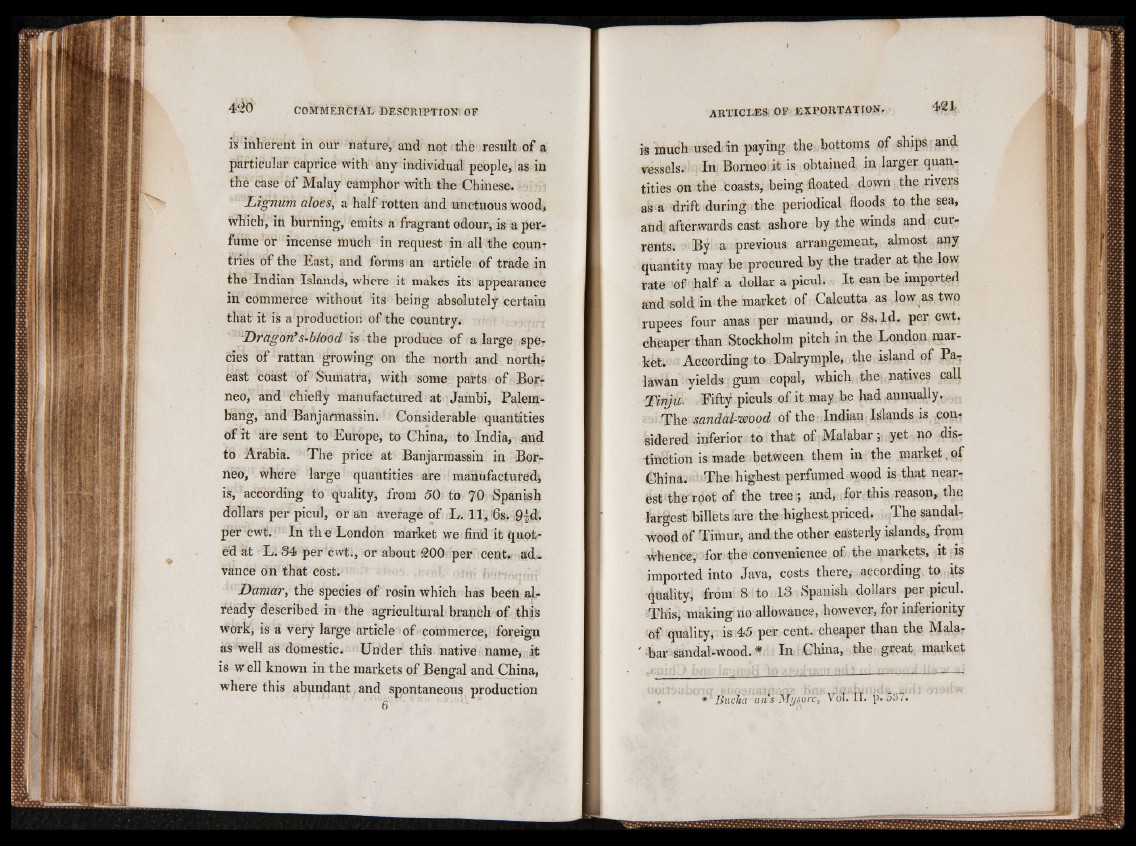
is inherent in our nature, and not the result of a
particular caprice with any individual people, as in
the case of Malay camphor with the Chinese«
Lignum aloes, a half rotten and unctuous wood,
which, in burning, emits a fragrant odour, is a perfume
or incense much in request in all the countries
of the East, and forms an article of trade in
the Indian Islands, where it makes its appearance
in commerce without its being absolutely certain
that it is a production of the country.
jDragon’s-blood is the produce of a large species
of rattan growing on the north and north*
east coast of Sumatra, with some parts of Borneo,
and chiefly manufactured at Jambi, Palem-
bang, and Banjarmassin. Considerable quantities
of it are sent to Europe, to China, to India, and
to Arabia. The price at Banjarmassin in Borneo,
where large quantities are manufactured,
is, according to quality, from 50 to 70 Spanish
dollars per picul, or an average of L. 11 , 6s. 9|d.
per cwt. In th e London market we find it quoted
at L. 34 per cwt., or about 200 per cent, advance
on that cost.
Lamar, the species of rosin which has been already
described in the agricultural branch of this
work, is a very large article of commerce, foreign
as well as domestic« f Under this native name, it
is w ell known in the markets of Bengal and China,
where this abundant and spontaneous production
6
is much used in paying the bottoms of ships and
vessels. In Borneo it is obtained in larger quantities
on the coasts, being floated down the rivers
as a drift during the periodical floods to the sea,
a n d afterwards cast ashore by the winds and currents.
By a previous arrangement, almost any
quantity may be procured by the trader at the low
rate of half a dollar a picul. It can be imported
and sold in the market of Calcutta as low as two
rupees four anas per maund, or 8s.Id. per cwt.
cheaper than Stockholm pitch in the London market;
According to Dairy mple, the island of Palawan
yields gum copal, which the natives call
Tinju. Fifty piculs of it may be had annually.
The sandal-wood of the Indian Inlands is considered
inferior to that of Malabar; yet no distinction
is made between them in the market, of
China. The highest perfumed wood is that nearest
the root of the tree :; and, for this reason, the
largest billets are the highest priced. The sandalwood
of Timur, and the other easterly islands, from
whence, for the convenience of the markets, it is
imported into Java, costs there, accoiding to its
quality; from 8 to 13 Spanish dollars per picul.
This, making no allowance, however, for inferiority
of quality, is 45 per cent, cheaper than the Mala-
' bar sandal-wood. * In China, the great market
** 'Bucfid’:ans ^Ty.sorc, Vol." IT. fi. b i/.